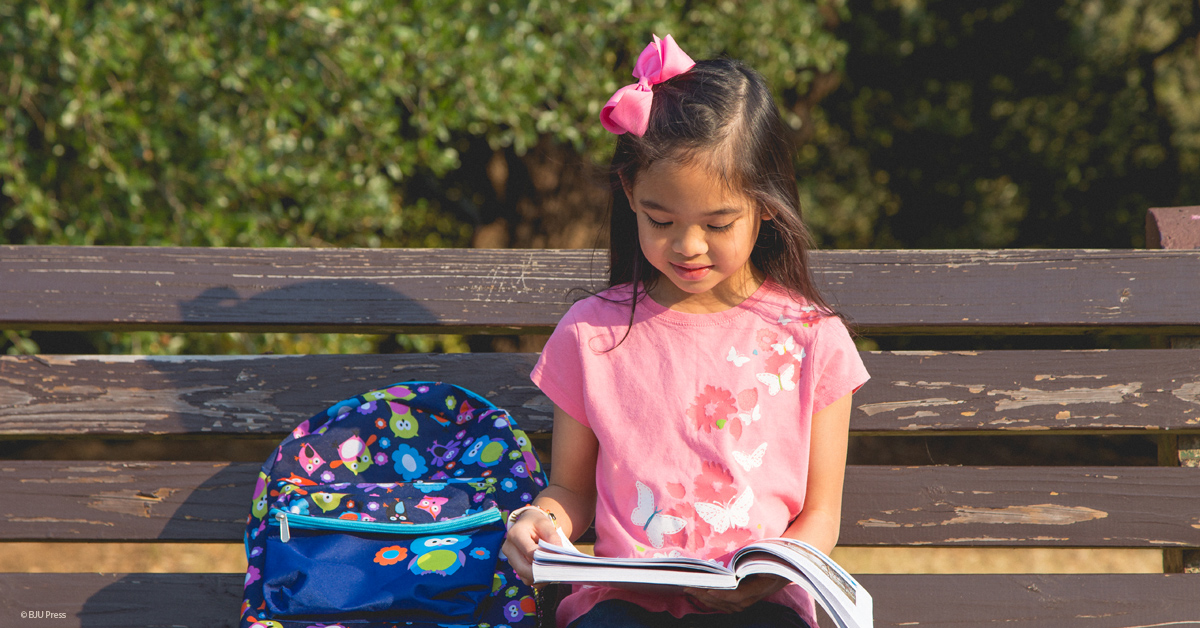
Tomorrow I get to teach a poetry lesson from Reading 2. My second-grade daughter and I are going to read Lillian Moore’s beautiful poem “Until I Saw the Sea.” I’m pretty excited because I get to introduce my daughter to an important literary device: imagery.
My second grader, however, isn’t quite as excited as I am. She would much rather read a fictional story about treasure-hunting (like the selection we just finished) or an article about tide pools (coming up in just a couple lessons). She doesn’t get excited about reading poetry—yet.
I hope that someday my daughter will share my love of poetry, but even if she never delights in poems, studying them will help her better fulfill her role as an image-bearer of God in several ways.
Studying poetry will help her become a better writer.
Good poets know how to take complex ideas and make them accessible. With very few words, they draw pictures in our minds to help us understand the extent of someone’s anger or sorrow, the power of natural phenomena, or the grandeur of a landscape. As my daughter studies poetry, she can apply some of the features of good poetry (such as precise language, conciseness, and imagery) to improve her own writing. As she creates beautiful written works, she is reflecting God as the quintessential Creator.
Studying poetry will help her empathize with others.
Poetry is often used as a means for self-expression, so studying it will help my daughter better understand others. Many poems treat difficult topics such as bullying, betrayal, abuse, and loss. These poems tug at the emotions and help foster compassion for those who are suffering in this sin-cursed world. That love and compassion for others is a reflection of the heart of God.
Studying poetry will help her recognize truth, beauty, and goodness.
God is Truth. He is also the ultimate expression of beauty and goodness. As my daughter studies poetry and comes to recognize the beauty and power of words to communicate truth, she’ll learn to recognize and appraise these elements in good writing and throughout the arts. (For a more detailed discussion on the role of truth, beauty, and goodness in the arts, see Biblical Worldview, pp. 384–99).
Studying poetry will help her read her Bible better.
Much of Scripture is poetry. Poetry isn’t just found in the poetical books; it’s also found throughout the Prophets, and even occasionally in the Law and History books. Hebrew poetry differs from English poetry, but many elements are the same. For example, during our poetry lesson we’ll look at examples of imagery in “Until I Saw the Sea,” and we’ll also look at its extensive use in Psalm 18.
I’m thankful for the opportunity to study poetry with my daughter this year.
BJU Press includes poetry selections in all its elementary reading and secondary literature products. Use the “Look Inside the Book” feature to see what each grade level includes.
I want to make sure that I’m open minded. It makes sense that studying poetry could be a good idea. I can see how that could also help inspire my creativity.
I loved how you mentioned that you can improve your own writing when studying poetry! My sister was telling me last night about how she wants to look into writing poetry to help her with finding a new hobby and was wondering if she should also study it to help her. I’ll make sure to pass this information along to her so that she can look into reading more poetry to help her with her writing!
One of the reasons that children balk at poetry is because the language, syntax, and vocabulary are more difficult than just reading a story. My mom (Jan Joss) used to tell me to read the poetry out loud several times first…”Poetry is for the ears!” she’d say. Once it seemed familiar, then a child can assimilate it and the hurdles are fewer. If you can get them to see a pattern in the poem and “write a new verse” to the poem, that helps them enjoy it more because the “mist of the unfamiliar” has cleared. Poetry lessons are fun!